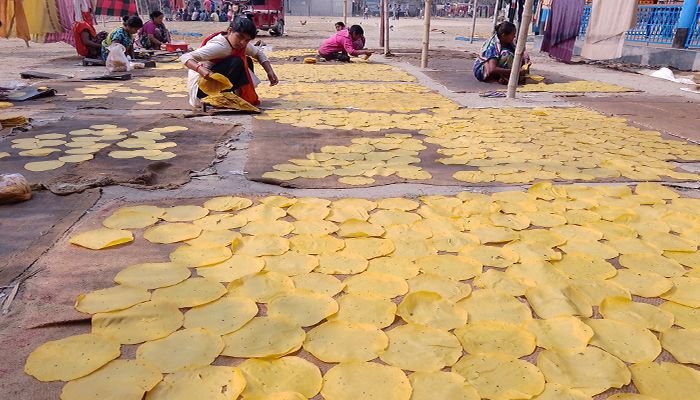Papad Industry: Workers being deprived of fair wage in Dinajpur

Dinajpur is home to a papad-making industry that has been thriving for over 600 years and is renowned worldwide for its unique taste.
These round, yellow papads, traditionally made from moong beans, once graced royal menus and were even exported to England in 2011.
Now, they remain popular across Bangladesh, from street food stalls to formal hospitality settings. Yet behind the sweet taste lies a bitter reality, the women who sustain this heritage face a life of hardship.
The backbone of this thriving industry is largely illiterate rural women, who balance household responsibilities while skillfully producing these delicacies by hand.
Papad-making hubs have developed across Dinajpur, including areas such as Chokbazar, Basuniapatti, Rajbati, and Borobandar.
Currently, around 25,000–30,000 workers are engaged in this sector. The papads are made from moong beans, khesari, gram flour, soybeans, and black cumin, with women performing each stage of production meticulously.
Despite the industry’s long history and global recognition, economic prosperity has not reached its creators.
Artisans share their struggles, “I have been making papad for more than ten years. Earlier, we were paid 10 taka for 100 papads, now it is 25 taka, yet it is still not enough to live on,” one worker said. While the market price of papad has increased, the wages for the labourers have remained stagnant.
Businessmen such as Dulal Mia explain that Chokbazar produces the highest quantity of papad in the district, and about 30 suppliers distribute it across the country.
Despite its immense economic potential, the papad industry has received little government support. Efforts to expand exports have largely failed due to the lack of sponsorship, infrastructure, and financial assistance.
Without systematic backing, the women who form the backbone of this traditional craft continue to struggle to make ends meet.
Local residents emphasise the importance of recognising the industry’s value. it provides employment to thousands of women, preserves cultural heritage, and carries significant economic promise. There is a strong call for government intervention through proper sponsorship, access to affordable credit, and measures that ensure fair wages for the workers. By supporting this heritage craft, the authorities can safeguard both the livelihood of the workers and the industry’s long-term sustainability.
The papad industry of Dinajpur is more than a food business; it represents centuries of tradition, skill, and perseverance. Ensuring that the women involved are paid fairly and treated with respect could usher in a new era of industrial and economic development in the region. Revival of this sector through proper government initiatives can transform it into a thriving model of cultural and economic prosperity, benefitting thousands of households and preserving a unique part of Bangladesh’s culinary heritage for generations to come.



